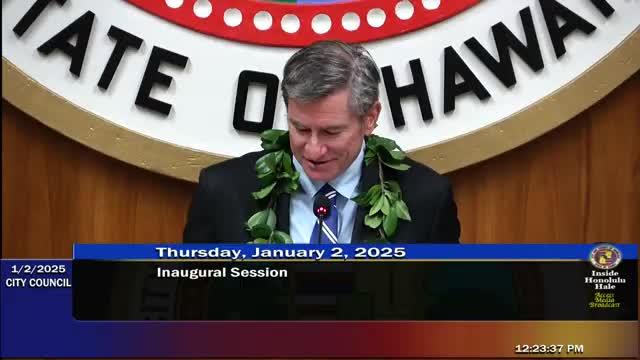Council Chair Waters frames housing, transit-oriented development and water protection as top priorities
Get AI-powered insights, summaries, and transcripts
Subscribe
Summary
In remarks after the oath of office, Council Chair Waters outlined priorities including transit-oriented housing at Iwilei and Aloha Stadium, collaboration on affordable housing with DHHL, protection of drinking water and concerns about major capital costs and the city budget.
Council Chair Waters used the inauguration ceremony to outline priorities for the new council, naming affordable housing, transit-oriented development and protection of drinking water as central concerns and urging collaboration among state and county partners.
Waters said the council will pursue housing projects along the rail line, identifying Iwilei and the Aloha Stadium area as sites for transit-oriented development. “If the State, the City, OHA who owns land there, Kamehameha Schools, Castle and Cook and private partners come together and build housing for local people,” Waters said, “we can transform lives.” Waters also cited a recent agreement with the Department of Hawaiian Home Lands to build affordable housing in Kailua as “unprecedented.”
On infrastructure and public health, Waters warned that housing depends on clean water. “If you don’t have clean drinking water, there is no affordable housing,” Waters said, and described ongoing discussions with the Department of Health and the Board of Water Supply. He listed several large capital items facing the city, including the need for a new landfill (mentioned as about $1,000,000,000) and upgrades to the Sand Island wastewater treatment plant (cited as between $1.8 billion and $2.5 billion). Waters also highlighted previous tax and relief measures the council enacted with the mayor’s office, including increasing the homeowner exemption for kupuna, raising a low-income tax credit, lowering certain residential property tax rates, and issuing a $350 refund to homeowners affected by rapidly rising property values.
Waters asked committee chairs to coordinate with the budget chair and department heads to identify savings and revenue options that would avoid burdening working families; he noted the empty homes tax had been discussed as one possible revenue source. Waters also announced that Council Member Cordero would serve as chair of the Council’s Planning, Infrastructure and Transportation Committee, a role Waters said would be important given that both Iwilei and the Aloha Stadium area lie along the rail line.
Waters framed the priorities as a call to collaborative, practical problem-solving and closed by urging urgency in addressing the city’s infrastructure and housing challenges.
